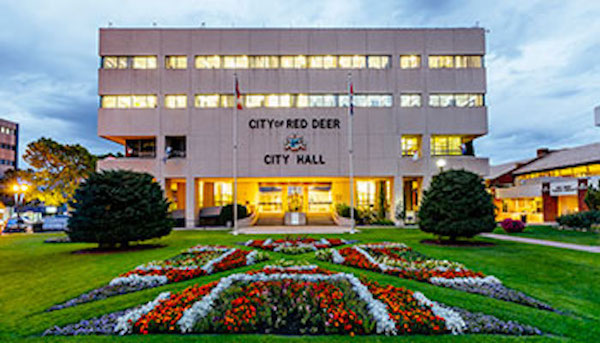City of Red Deer
‘Common Sense’ says City Council should avoid potentially massive tax increase

Submitted by Common Sense Red Deer
By Chad Krahn
More than a month later than normal, the City has finally released its proposed budget adjustments.
The numbers give Council – and the public – a much clearer picture of the City’s finances.
They’re not great.
They’re not even good.
In fact, the picture the proposals paint is pretty bleak.
The City is facing a $16.1 million shortfall, and is rapidly approaching its debt limit.
The reserves are also nearly gone as a result of using those funds to cover the shortfall in previous years instead of making a major course correction.
The tax increase to make up the shortfall is in the double digits – 10.65 per cent.
That’s a huge increase, but it’s made even worse by the fact that there’s no extravagant infrastructure project or big spending item on the books – it’s simply to maintain the operational status quo.
Let that sink in. For the City to continue offering the same level of services, they will need to raise taxes by 10.65 per cent.
Compare that with Statistics Canada’s November inflation rate – and Alberta’s projected 2024 inflation rate – of 2.5 per cent.
The City’s expenses are outpacing inflation and, more importantly, economic growth.
Council will hopefully do its best to soften the blow when the budget adjustments are actually debated later this month, but the built-in deficits that have crept into the budgeting process are going to haunt us.
Nearly every other municipality had their budget debates take place in November, but Red Deer’s are taking place on January 23-26.
Council will be left with the unenviable decision to either raise taxes, cut services, drain reserves or sell off assets.
If only there had been a way to prevent this.
Where are the learnings from the last few years? Where is the commitment to incremental improvement? A system of asking the front line staff ‘what is the next simple thing we can do to make this better’ to find that smart, bottom-up change. Taking that feedback to innovate and automate the way the City does business before we end up staring down big tax increases and no economic growth.
Red Deer’s population has largely plateaued, and consequently, so have housing starts.
Contrast that with other cities in Alberta – Calgary, Edmonton, and Lethbridge are all seeing their populations grow and new homes being built.
Alberta as a whole had such high rates of interprovincial migration that they ended their “Alberta Is Calling” program, originally designed to attract people to the province.
Worse still, Red Deer has the highest unemployment rate for a major region in Alberta.
Why is Red Deer stagnant?
The status quo approach to business hasn’t worked. The City interacting with business the same way it always has is producing diminishing returns.
We need a Council Committee on Red Tape Reduction, along with a dedicated commitment to reexamine the building code and a promise to industry to have a guaranteed turnaround time on issuing permits.
The downward trend in economic growth should have already set a five-alarm fire for the City. After all, they had to know how dire the financial situation already was.
Alberta is growing, and comparable cities across the province are all growing, but Red Deer’s graph is pointing in the wrong direction. The budget document even says that the city’s economic development resources are spread too thin and generally focused on land development and sales.
It also notes that economic leaders should all be in alignment, but the budget documents admit that the alignment isn’t there.
Getting our economic drivers aligned should be a top priority – getting all of Team Red Deer firing on all cylinders needs to happen immediately.
We can’t wait until some new report comes out in 2025.
We know what the problems are.
We’ve known for a long time.
This is an incredible place to live, yet somehow, the story is going untold.
Red Deer could be so much more.
Chad Krahn is the Executive Director of Common Sense Red Deer.
City of Red Deer
Red Deer will choose a new Mayor as Ken Johnston decides to step away

It’s a telling detail about the person who leads Red Deer City Council. Always putting the city’s needs ahead of his own, Mayor Ken Johnston has announced his intentions within days of the opening of Nominations for October’s municipal elections,
After 12 years on council, Mayor Ken Johnston has decided against running for a second term as Mayor this fall. Johnson shared his decision in front of colleagues and supporters in a touching announcement on Wednesday.
At 71 years old, Johnston remains vibrant, passionate and healthy. He says that’s exactly why he and his wife Carolyn have decided now is the right time to start their next stage of life together.
Mayor Johnston listed a number of highlights and achievements he can look back on, including his help advocating for the redevelopment of Red Deer Regional Hospital, the growth of Red Deer Polytechnic, and positive moves in Economic Development.
All these lead of a feeling of ease about the decision to step away, though affordable housing and a permanent shelter for the homeless remain pressing concerns.
With about 8 months remaining in his term, Mayor Johnston is planning to push hard to move the needle on these housing issues.
“We’re looking forward to some more work and we’ll be going to the community shortly about it. So I still have optimism that maybe before the term is out we can have an announcement.”
This is the second major political announcement in Central Alberta in the last number of days. Earlier this week Red Deer Mountain View MP Earl Dreeshen announced he won’t be running in the next federal election.
City of Red Deer
Council ends reduced fine option for early ticket payment, school and playground zones start at 7 AM

City Council approves first reading of updated Traffic Bylaw and General Penalty Bylaw
Red Deer City Council completed first reading of updated Traffic Bylaw (3707/2025) and General Penalties Bylaw (3036/A-2025) that will provide clarity and consistency in application of the bylaws as well as eliminate challenges in enforcement.
Key updates to the bylaws include:
- Ticket Pre-Payment:
- Removing the option to pay a parking ticket early to receive a reduced fee from the General Penalty Bylaw and adding it to the Traffic Bylaw.
- School and Playground Zone Start Times:
- Through investigating requests from schools to have school and playground zones start at 7 a.m., rather than 8 a.m., Administration determined that almost all school and playground zones in the city have students on the street prior to 7:30 a.m. To be consistent across the city, the start time is being moved to 7 a.m. providing an added measure of safety for all students.
- Salt on Sidewalks:
- Removing the provision prohibiting the use of salt on sidewalks as this provision was rarely reported and it is difficult and costly to enforce.
- Permits:
- More structure was added to the bylaw to clearly articulate conditions and requirements of Use of Streets Permits, as well as Excavation Permits and Alignment Permits.
- Lastly, fees for closures impacting on-street and off-street stalls have been adjusted to reflect the actual revenue in each parking zone rather than the flat fee.
- Penalties:
- Penalties have been reviewed and updated.
- During the last bylaw adoption, the penalty associated with vehicles being towed due to snow or street sweeping operations was inadvertently missed. This penalty has been added back in at a slightly higher amount due to an increase in the cost to tow a vehicle through The City’s contractor. This prevents the costs associated with towing vehicles during these operations from being subsidized by the tax base.
“These updates streamline the bylaws to create clarity for residents and administration,” said Erin Stuart, Inspections and Licensing Manager with The City. “They also help to eliminate regulations that are challenging to enforce and bring penalties in line with other City Bylaws.”
Second reading of both bylaws is anticipated for January 27, 2025.
-

 2025 Federal Election2 days ago
2025 Federal Election2 days agoPoilievre refuses to bash Trump via trick question, says it’s possible to work with him and be ‘firm’
-

 COVID-192 days ago
COVID-192 days ago17-year-old died after taking COVID shot, but Ontario judge denies his family’s liability claim
-

 Alberta1 day ago
Alberta1 day agoAlberta Institute urging Premier Smith to follow Saskatchewan and drop Industrial Carbon Tax
-

 Business2 days ago
Business2 days agoWhile “Team Canada” attacks Trump for election points, Premier Danielle Smith advocates for future trade relations
-

 2025 Federal Election1 day ago
2025 Federal Election1 day agoFool Me Once: The Cost of Carney–Trudeau Tax Games
-

 Addictions1 day ago
Addictions1 day agoShould fentanyl dealers face manslaughter charges for fatal overdoses?
-

 Alberta1 day ago
Alberta1 day agoAlbertans have contributed $53.6 billion to the retirement of Canadians in other provinces
-

 Automotive2 days ago
Automotive2 days agoTrump announces 25% tariff on foreign automobiles as reciprocal tariffs loom





